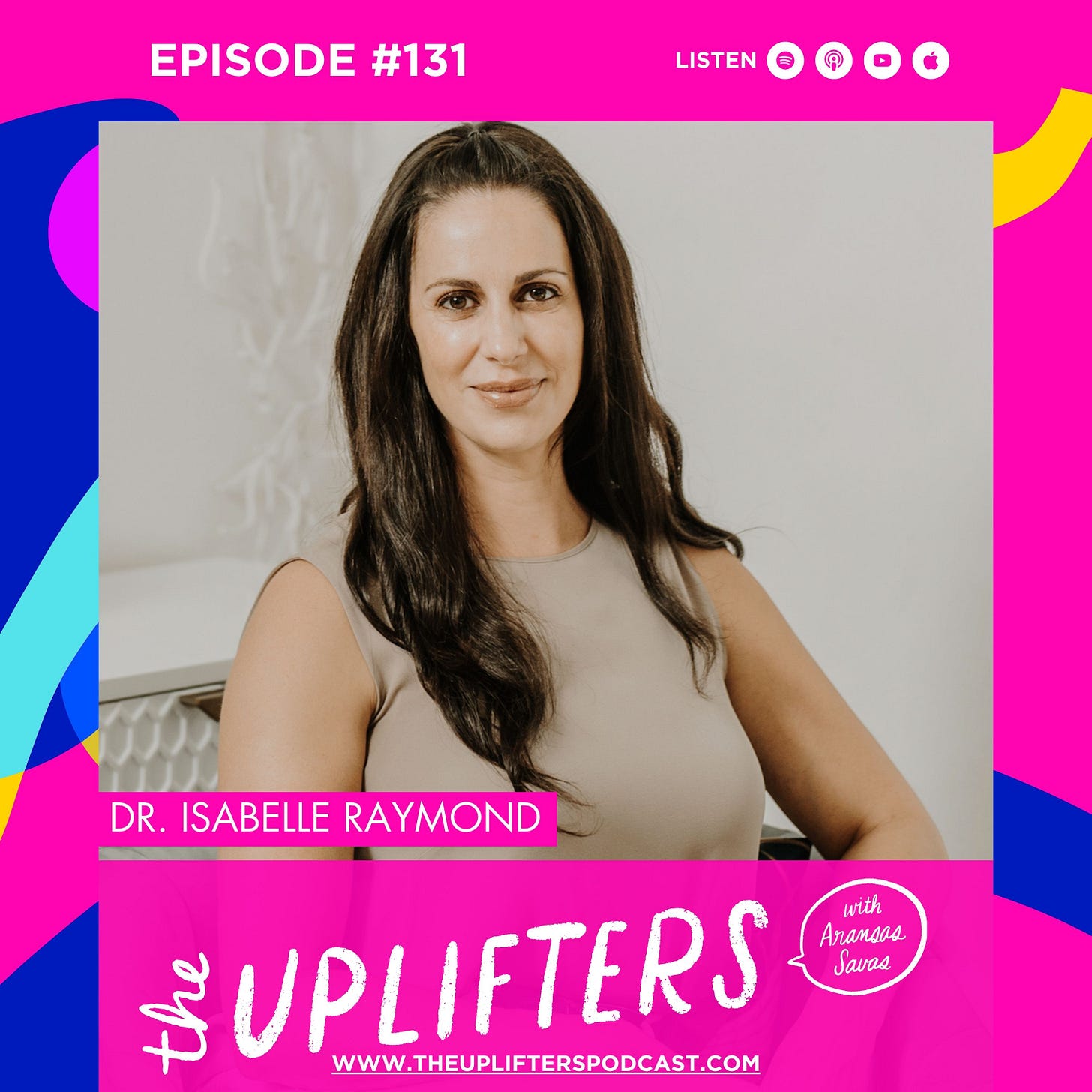#131: Nutrafol’s Dr. Isabelle Raymond
The Scientist Who Made Menopause Research Personal
Hi! New here? I've spent the last 20 years at the intersection of behavior change research and coaching. On The Uplifters Podcast, we share diverse stories of trailblazing, change-making women who are doing big, brave things in the second half of their lives, and showing us how we can too!
Listen to This If You’ve Ever:
Experienced menopausal or perimenopausal hair thinning
Been told something is “just part of aging” when you know there must be a better answer
Struggled to find ways to address menopausal symptoms and places where you can comfortably share your experiences
Realized that the “default” medical knowledge you’ve been given might not actually apply to your body
This Week’s Featured Uplifter: Dr. Isabelle Raymond
There’s this moment, maybe you’ve had it too, when your body starts doing something new, something strange, and you think, “Is this normal? Is this me normal?” For Dr. Isabelle Raymond, that moment arrived in front of a Zoom camera during the pandemic, staring at her widening part line while helping design a clinical study about menopausal hair loss.
The researcher became the subject. The expert became the beginner.
She’d spent two decades studying everything from sleep medicine to neurotoxins to dermatology (because yes, Botox started as a treatment for muscle spasticity before anyone thought about wrinkles). She’d worked with pharmaceutical companies, designing rigorous clinical trials that could withstand FDA scrutiny. But when perimenopause arrived, uninvited, unannounced, and utterly bewildering, she realized something shocking: she didn’t know what was happening to her own body.
And if she didn’t know, with all her education and access and scientific training, what chance did anyone else have?
This is the paradox of women’s health in 2025. We’re more educated than ever, more connected than ever, more willing to speak up than ever. Yet we’re still operating in a medical landscape that treated us as an afterthought, a footnote to the “default” male body, where our hormonal fluctuations were seen as too messy, too variable, too complicated to study properly.
Isabelle’s journey from scientific leader in the pharmaceutical and biotech industries, to becoming the Head of Clinical and Medical Affairs at Nutrafol, isn’t just about career pivots or following your passion (though it’s certainly that). It’s about what happens when a woman with the power to design research decides to ask the questions that should have been asked decades ago: What happens to women’s bodies as estrogen fluctuates? Why does no one talk about the fact that you have estrogen receptors on every organ, including your hair follicles? And why, for the love of all that is scientific and holy, were we the first brand to actually study menopausal women and their hair loss?
5 Ways She Shows Us How to Build Our Courage Capital
1. Use your expertise to ask the questions others aren’t asking
Isabelle used her unique scientific perspective in clinical research to solve the problem.
2. Treat your own experiences as valid data points worth investigating
A pool of anecdotes isn’t data, but it’s absolutely an indication of where to look. When Isabelle felt her body changing, she didn’t dismiss it as “in her head”; she designed studies to understand it. Your lived experience isn’t less valuable than published research; it’s the starting point for better research.
3. Normalize the conversations others are afraid to have
By talking openly about brain fog, by laughing with her team when she can’t find a word, by bringing her whole self to her professional role, Isabelle makes it safer for everyone else. Sometimes courage is just refusing to pretend everything’s fine when it isn’t.
4. Schedule self-care with the same rigor you schedule everything else
Isabelle treats her well-being appointments like unmovable meetings because that’s the only way they happen. This isn’t about “balance” (whatever that means), it’s about recognizing that you can’t do good work from an empty tank.
5. Remember that being the first means opening doors for everyone behind you
Isabelle was in a position to design the first hair thinning study specifically for menopausal women. She could have just... not. She could have stuck with the easier, more established research pathways. But then no one else could have cited that research, built on that foundation, or validated their experiences with that data. Being first is hard. It’s also how things finally change.
Referenced Resources
Nutrafol: The number one dermatologist-recommended hair growth supplement brand, built on science and a whole-body approach
The Menopause Edit: Nutrafol’s first-ever magazine dedicated to redefining the conversation around menopause, full of data and information about women’s health through midlife and beyond
Nutrafol’s Menopausal Study: The first hair brand supplement to study menopausal women with hair thinning specifically
Use code UPLIFTERS at nutrafol.com for a special discount
Lift Her Up
Follow Nutrafol on Instagram for ongoing education about women’s health
Share this episode with women who need to hear that their symptoms are real and worth investigating
Support research that centers women’s actual experiences rather than treating us as afterthoughts
If You Liked This Story, Check Out These Episodes Next
Julie Gordon White (MenoWell) - created the menopause power snack she needed during her transition
Denise Pines (Producer of The M Factor Film) - age enthusiast, longtime community health advocate, and media pioneer
Konika Ray Wong (Girl Power Science) - creating education that centers girls’ actual bodies and experiences
Uplift With Us!
🌟 Wear your inspiration with an Uplifter necklace. Treat yourself or gift one HERE.
💡 Need clarity on your next chapter? Explore private coaching to illuminate your path HERE.
🚀 Is your team ready to soar? Discover how we can boost your high performers HERE.



